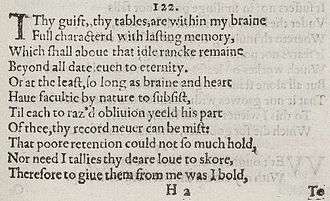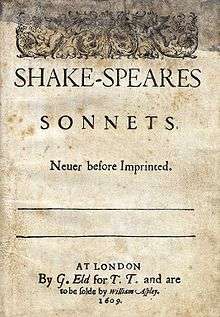Sonnet 122
| Sonnet 122 | |||||||
|---|---|---|---|---|---|---|---|
 The first eleven lines of Sonnet 122 in the 1609 Quarto | |||||||
|
| |||||||
| |||||||
Sonnet 122 is one of 154 sonnets written by the English playwright and poet William Shakespeare, and first published in 1609. It is a member of the Fair Youth sequence, in which the poet expresses his love towards a young man. Although the relationship started exuberantly in Sonnet 18 ("Shall I compare thee to a summer's day") by now it has given way to an almost defensive tone. The poet justifies giving away or losing a notebook ("tables") given him by the youth to record shared events by saying that his memories of them are stronger.
Structure
Sonnet 122 is an English or Shakespearean sonnet. The English sonnet has three quatrains, followed by a final rhyming couplet. It follows the typical rhyme scheme of the form abab cdcd efef gg and is composed in iambic pentameter, a type of poetic metre based on five pairs of metrically weak/strong syllabic positions. The 1st line exemplifies a regular iambic pentameter:
× / × / × / × / × / Thy gift, thy tables, are within my brain (122.1)
- / = ictus, a metrically strong syllabic position. × = nonictus.
Line 4 exhibits a mid-line reversal:
× / × / / × × / × / Beyond all date; even to eternity: (122.4)
Lines 3, 5, 11, and 14 all have potential initial reversals. Line 10 potentially incorporates a rightward movement of the third ictus (resulting in a four-position figure, × × / /, sometimes referred to as a minor ionic):
× / × / × × / / × / Nor need I tallies thy dear love to score; (122.10)
However, if "thy" receives emphasis, the line becomes regular again.
The meter demands that line 4's "even" function as one syllable, and line 7's "oblivion" as three.[2]
Notes
- ↑ Pooler, C[harles] Knox, ed. (1918). The Works of Shakespeare: Sonnets. The Arden Shakespeare [1st series]. London: Methuen & Company. OCLC 4770201.
- ↑ Kerrigan 1995, p. 344.
References
- First edition and facsimile
- Shakespeare, William (1609). Shake-speares Sonnets: Never Before Imprinted. London: Thomas Thorpe.
- Lee, Sidney, ed. (1905). Shakespeares Sonnets: Being a reproduction in facsimile of the first edition. Oxford: Clarendon Press. OCLC 458829162.
- Variorum editions
- Alden, Raymond Macdonald, ed. (1916). The Sonnets of Shakespeare. Boston: Houghton Mifflin Company. OCLC 234756.
- Rollins, Hyder Edward, ed. (1944). A New Variorum Edition of Shakespeare: The Sonnets [2 Volumes]. Philadelphia: J. B. Lippincott & Co. OCLC 6028485.
- Modern critical editions
- Atkins, Carl D., ed. (2007). Shakespeare's Sonnets: With Three Hundred Years of Commentary. Madison: Fairleigh Dickinson University Press. ISBN 978-0-8386-4163-7. OCLC 86090499.
- Booth, Stephen, ed. (2000) [1st ed. 1977]. Shakespeare's Sonnets (Rev. ed.). New Haven: Yale Nota Bene. ISBN 0-300-01959-9. OCLC 2968040.
- Burrow, Colin, ed. (2002). The Complete Sonnets and Poems. The Oxford Shakespeare. Oxford: Oxford University Press. ISBN 978-0192819338. OCLC 48532938.
- Duncan-Jones, Katherine, ed. (2010) [1st ed. 1997]. Shakespeare's Sonnets. The Arden Shakespeare, Third Series (Rev. ed.). London: Bloomsbury. ISBN 978-1-4080-1797-5. OCLC 755065951.
- Evans, G. Blakemore, ed. (1996). The Sonnets. The New Cambridge Shakespeare. Cambridge: Cambridge University Press. ISBN 978-0521294034. OCLC 32272082.
- Kerrigan, John, ed. (1995) [1st ed. 1986]. The Sonnets ; and, A Lover's Complaint. New Penguin Shakespeare (Rev. ed.). Penguin Books. ISBN 0-14-070732-8. OCLC 15018446.
- Mowat, Barbara A.; Werstine, Paul, eds. (2006). Shakespeare's Sonnets & Poems. Folger Shakespeare Library. New York: Washington Square Press. ISBN 978-0743273282. OCLC 64594469.
- Orgel, Stephen, ed. (2001). The Sonnets. The Pelican Shakespeare (Rev. ed.). New York: Penguin Books. ISBN 978-0140714531. OCLC 46683809.
- Vendler, Helen, ed. (1997). The Art of Shakespeare's Sonnets. Cambridge, MA: The Belknap Press of Harvard University Press. ISBN 0-674-63712-7. OCLC 36806589.
.png)
